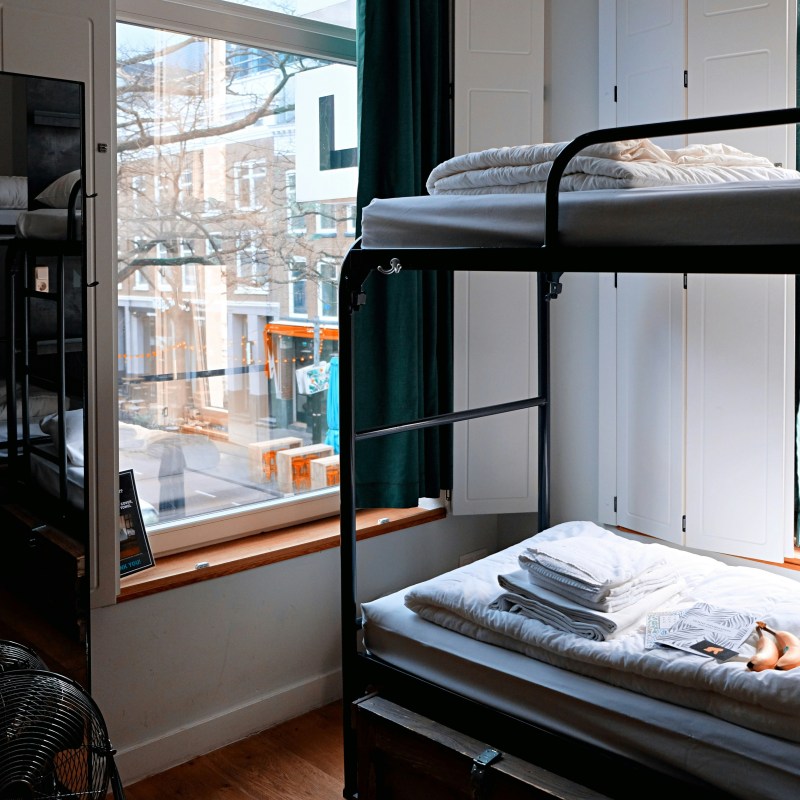
Hostels are overwhelmingly geared toward young travelers.
Videos by TravelAwaits
That’s usually due to their amenities. Most hostels are designed to be cheap and offer the bare minimum in terms of features. In exchange, guests save big on their trips—and usually make a few friends along the way.
That’s the key ingredient here aside from slashed prices: Communal space that’s designed for mingling.
I’ve stayed in hostels around the world. They’ve varied greatly in terms of appeal, amenities, and livability.
In London, my hostel stay saw me crammed into a room with twenty bunk beds. Situated inside an old courthouse near King’s Cross, it was a highly unique trip. (Interesting fact: Multiple guests in my shared room were London locals who had moved into the hostel temporarily to save on rent.)
I’ve also stayed at bare-bones spots in tropical destinations like Costa Rica. In Puerto Viejo, Costa Rica, I rented a hammock for the night. This spot was designed for broke backpackers and college students like me. (Interesting fact: I was bitten by a horse at this hostel.)
I’ve stayed at YMCAs in Umea, Sweden; in hostels in Ho Chi Minh City, Vietnam; in home stays in Goa, India; in boutique hostels in Berlin, Germany.
There’s one thread that ties all of my hostel experiences together—
Rubbing elbows with like-minded travelers. (And one horse.)
And despite the fact that most hostels are geared toward younger travelers, that’s not the case across the baord.
If you feel that you’ve phased out of your hostel era due to your interest in creature comforts and your age, then think again. I’ve stayed in hostels well into my thirties without any hiccups. I’m here to sell you on the notion of hostels for adults.
Why you shouldn’t write off hostels for adults
They come in all shapes and sizes
Not many travelers over the age of 30 are wooed by the idea of a hostel.
Most people believe hostels to be the domain of party-hungry twenty-somethings where guests need to wear flip-flops in the showers and put in earplugs to get through the night.
That’s absolutely the truth for many youth hostels… but it’s not necessarily true across the board.
Like hotels, hostels can be pricier and more upscale than their bunkbed-centric counterparts. A great example is KEX Hotel in Portland, which offers hostel-style bunkbed rooms that rent out beds individually.
It’s beautiful, upscale, and re-bookable as hell.
They’re cost-effective
Once a budget-conscious traveler, always a budget-conscious traveler.
Even when we start earning more, it can be hard to kick those travel spending habits. Savings is yet another reason that hostels are a solid go-to again and again.
Even more luxurious hostels (including KEX Hotel) are cheaper than hotels and private rentals of similar standing. Most also include basic amenities like breakfast, ultra-fast Wi-Fi, and helpful staff.
In fact, hostel staff are some of the most helpful guides you can have when arriving in a new place. They’re used to handing out recommendations—so their lists are usually very refined.
They’re immersive
Along with breakfast and Wi-Fi, there’s yet another amenity that hostels excel with. That’s the location.
Let’s head back to the original purpose of the hostel: To offer cheap lodging to young travelers who want to experience a place. Because they don’t want to spend on transportation, hostels tend to be located centrally.
That means that you can usually find a hostel in a city center or near major landmarks—or several hostels, depending on the city.
On a less fun but equally helpful note, many hostels are also located near facilities like laundromats, grocery stores, and other budget-traveler essentials.
They’re great for short-term or long-term travel
Hostels are incredibly flexible with their booking terms.
Want to stay a whole month? That’s not a problem.
Want to switch to a communal or private room midway? They’re happy to help—usually that day.
What about stays that you need to shave a few days off of? Also not a problem for the average hostel.
Obviously, I’d recommend asking staff about the policies on changing rooms before banking on anything. But hostels are very dynamic and flexible in their approach, making last-minute changes less stressful.
They put you close to likeminded travelers
I’ve saved the best benefit for last. Usually, hostel rooms are pretty minimal. Even nicer, private rooms might be small and designed for sleep or rest.
The focus is, invariably, on communal space. In lieu of offering over-the-top amenities, hostels offer great lounges, game rooms, working areas, and more for their guests.
If you’re a solo traveler who feels exhausted by the daunting task of making friends or mingling, then hostels are a great solution. It bakes a bit of social interaction into your day.
Additionally, many hostels for adults curate event calendars for guests. That might include socials in the hostel or popular events nearby.

